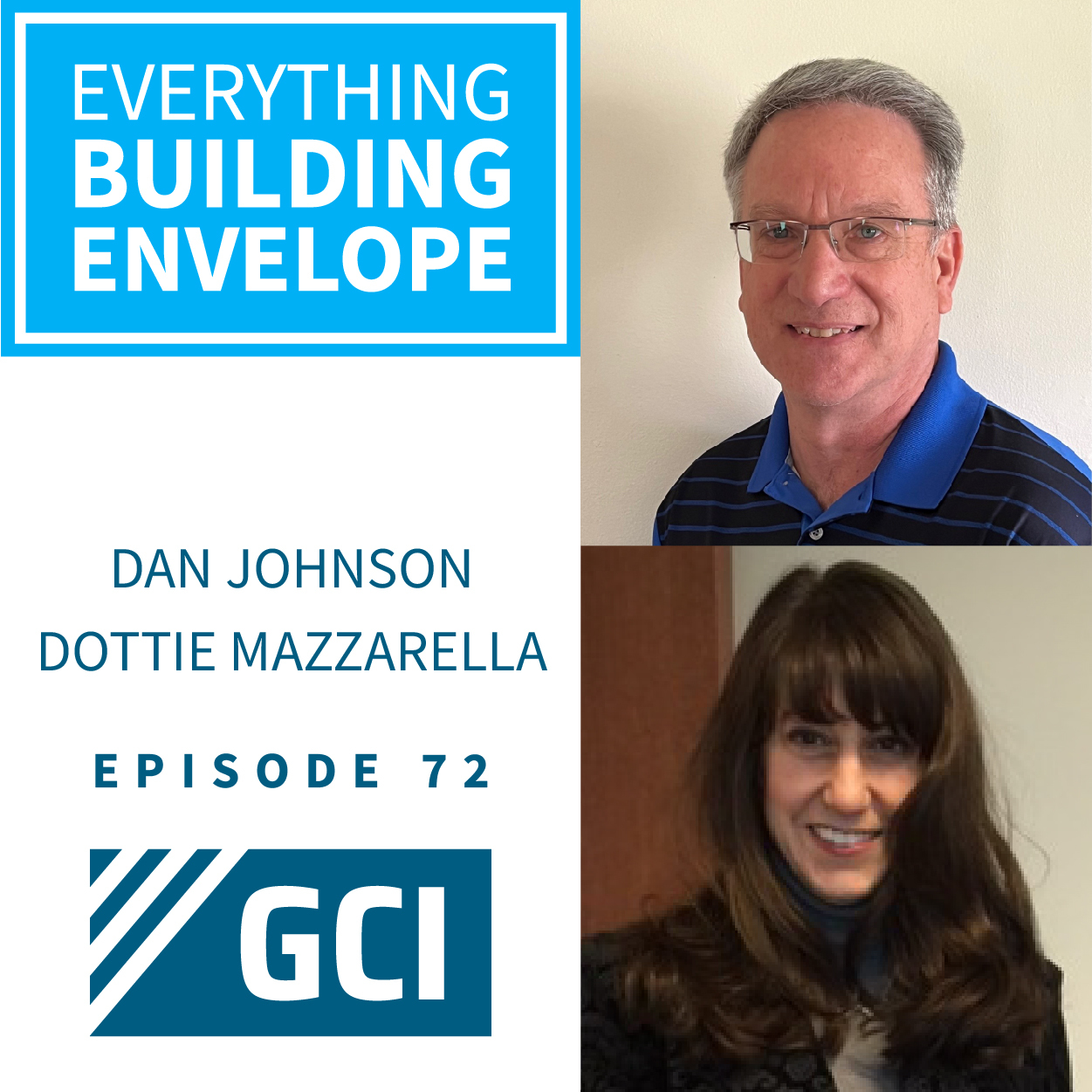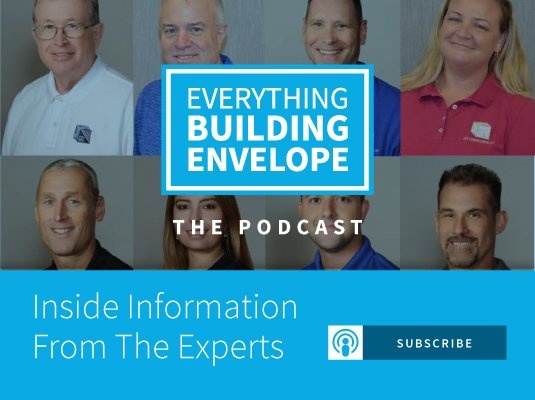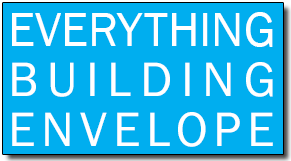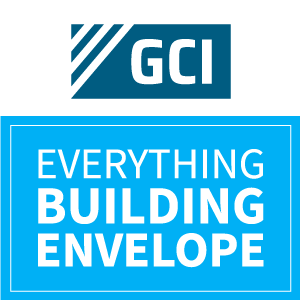
About The Everything Building Envelope Podcast: Everything Building Envelope℠ is a dedicated podcast and video forum for understanding the building envelope. Our podcast series discusses current trends and issues that contractors, developers and building owners have to deal with related to pre and post construction. Our series touches on various topics related to water infiltration, litigation and construction methods related to the building envelope.
https://www.everythingbuildingenvelope.com
*** Subscribe to the show and leave us a Review on ITunes!

Dan: Welcome everyone to our “Everything Building Envelope” podcast. I am Dan Johnson, Senior Consultant for GCI Consultants, and I will be your host today. I’m excited to have as our guest, Dottie Mazzarella, the Vice President of Government Relations for the International Code Council. Today, our topic is going to be the international building code development and specifically, the International Property Maintenance Codes. So, Dottie, let’s start off by having you tell our audience a little bit about yourself, and then we’ll dig into the topic.
Dottie: Okay, great. Dan, thank you so much. I’m Dottie Mazzarella, as you mentioned, I’m the Vice President of Government Relations for the International Code Council, or ICC. A lot of people know us with just the abbreviation. And I am lucky enough to cover two very important states, New York and Florida. And I just recently moved from New York to Florida, so now I’m going back and forth a little bit, but it’s really just I love my job, and I love working with both states.
Dan: Well, great, Dottie. Sounds like you’ve been primarily on the East Coast, which seems to be where a lot of the building codes have been in real enforcement and are definitely needed. So if you could kind of explain a little bit, what are the international building codes and how are they developed?
Dottie: Oh, sure. I would love to do that. So I’d like to say that the International Code Council is really, we’re the stewards of the code development and creation process. So we have the unique ability to bring together pretty much every affected organization when it comes to any type of building construction and building in or updating in the built environment. So that means labor, architects, engineers, builders, contractors, but then also the regulators themselves.
So the building and fire officials, the code enforcement officials, and then depending on the specific discipline of the code, so the plumbing inspectors, mechanical inspectors. So really anybody involved with that. And that’s not just on the local level, but it’s also the state level. So depending on if it’s a statewide adoption, you’re going to have some type of state adoption entity like a board or a commission, and then also the federal government. We have many federal agencies, FEMA, HUD, you know, the EPA, several organizations or several federal agencies are very active participants in the code development process.
So it’s really just kind of bringing all these groups together who then will propose their code changes, whether it be following a natural or a manmade disaster, a lesson learned possibly from one of those disasters, building collapses, what have you, but it also could be making sure that we are incorporating a new method of construction. So, you know, we often think of the building codes as those, you know, dealing only with life safety, but oftentimes, it might be a new manufacturer has created a material that is code compliant and provides adequate life safety, but also might be cost-effective.
So we want to make sure that we’re incorporating all those new methods of construction or new materials into each version of the code and the codes do come out every three years. So they’re, you know, always being kept up-to-date for jurisdictions to adopt.
Dan: Okay. Well, that’s a great background on it. It sounds like there’s a whole collaboration of many different facets of the building industry. And with that collaboration, it must be difficult in order to get everybody on the same line or the same page, so to speak. How often do the different committees meet, and what’s kind of that process?
Dottie: Oh, absolutely. So we have to break it down since there are so many codes. We do break it down into Group A and Group B. So right now, for example, we’re in the Group B cycle, and we always will start with a spring hearing where the committees will get together and actually vote on the proposals. So it really goes back to the beginning of the year, where people can propose code changes and then the committees will deliberate and all that can be done online.
So the code development process, you know, begins online. You can propose a code change, and it’s written just in like legislative language, so strikeouts. So you take an existing code section and maybe strike out or add a new provision. And then the committees will meet, and those are done in person. People can attend and participate from that regard, but they’re also online. So they are webcast, and the committees will actually vote on those code change proposals.
And the committee members are representative of virtually every affected organization. So, for example, you know, I’ll use the fire code, you know, not only are there the code enforcement regulator side, so those people doing the enforcement, so your building officials, fire officials, but then you also would have representatives of the users. And then we also make sure that it’s also representative of the country or itself. So we wouldn’t want to have, you know, too many people from say the East Coast or West Coast or North, South. We want to make sure that we’re incorporating individuals from all different parts of the country or internationally. We do have, you know, quite a bit of international participation as well.
And so those committees will vote, and then it will go to…it’ll go through a review process, a public comment process. And then we go to what’s called the “governmental consensus vote.” It used to be referred to as the “final action hearings.” And that’s when only those people involved with the enforcement of the codes will make that final vote. So that final vote of what ends up getting put into the code is reserved for those people doing the enforcement. So it wouldn’t be someone that has a financial gain. It would just be a representative of a local or state or federal government who’s actually doing that final vote.
And then it really goes to our staff, our technical staff, who make sure that…well, there is a Code Correlating Committee, I should also say. Because the codes do work as a family, so we want to make sure that within the building code is also referenced by the fire code or the plumbing code. And then our staff works to make sure that things are incorporated properly, and then the codes get published on a three-year cycle. And we make sure that when the codes are released to the public, that they are out in advance of that year.
So, for example, what’s being deliberated now is the 2024 codes. The Group A cycle has already met. Group B is meeting now. And then during that third year, it’s doing that code correlation, making sure that everything is referenced properly, and then we will publish those codes. And they’re usually out September of the previous year. So it’ll be September of say, 2023 that the 2024 codes will be issued.
Dan: Okay. That sounds like it’s a lengthy and time-consuming and a great process so just to get everybody all on the same page and get all the best minds to put the codes together. Once the building codes and standards are developed and then adopted by the local jurisdictions, how do they help prevent tragedies such as the one that was experienced in Florida last year with the Surfside condominium collapse?
Dottie: You know, exactly, you know what you had said by making sure that states and jurisdictions are adopting the most up-to-date building codes. You know, we do learn from tragedies such as Surfside. I could say 9/11. You know, I hate to say it’s one of those…you know, when we think of we just had the year anniversary of the Surfside building collapse on Friday, the 24th of June, and we want to make sure that we learn from those disasters.
And, of course, the National Institute of Science and Technology is doing a very exhaustive study as they did, for example, in 9/11. And there will be recommendations that come out of those types of studies. And so I reference 9/11 because I was intimately involved in that process. And those recommendations that came out of the NIST report was incorporated into the codes and jurisdictions did adopt those.
And, you know, I should also mention jurisdictions, of course, can modify the codes. You know, I like to say that the international codes are a minimum standard and jurisdictions may amend them to represent, you know, their building enforcement regulations or other unique things that they want to incorporate, or, you know, provisions into the codes. But for most part, the international codes are a minimum standard. You know, we would highly recommend that jurisdictions not go less restrictive.
Certainly, they have the right to go more restrictive as many do. It really starts as a very good starting point of the minimum code requirements. So making sure that jurisdictions are staying current. So, you know, the codes are coming out every three years, making sure that we’re incorporating those code changes. I think the best way to see that the codes are working is years later when a hurricane does come and we saw that from Katrina to say, Michael, you know jurisdictions fared better, homes fared better than they did before.
And even dating back if you think about Florida, you know, with Hurricane Andrew, that’s when the building codes did get quite strong in Florida. And after more recent hurricanes, homes and commercial construction did perform much better. So we know the codes work. But, you know, it’s proper maintenance as well. You know, I always like to say the code books are just a book on the shelf. You know, we need to make sure that the enforcement is behind it.
So, you know, they’re only going to be effective when they’re adopted, implemented, and properly enforced and maintained. So that’s really important. And then I would even take a step further to say that, you know, are the local building departments, state building departments, you know, being staffed adequately? Are they given the resources that they need to do their jobs? You know, because the last thing we would want is, you know, one individual responsible for a jurisdiction and stretched so thin that they’re not able to do their job to the extent it needs to be done.
So it is really important. You know, the formula for success is, of course, you know, getting those codes adopted, implementing those codes, but then supporting them by adequate staffing, training, and making sure they do have the resources that they need to do the job properly. You know, code enforcement is truly a profession and, you know, local government, state governments have to take that very seriously.
Dan: Yeah. That’s very true. You can have all the proper codes and everything out there, but if they don’t get enforced, all they are is just words on a piece of paper. That’s very true. With that being said, I know there’s some recent legislation signed by Governor DeSantis in Florida for stricter condominium inspections. Can you tell me a little bit about that?
Dottie: Yes, of course. So you’d be paying attention to the age of a building. So when a building reaches…and it would be 3 stories and over of condominium, when a building would reach 25 years if it’s within 3 miles of the coastline, or 30 years if it’s further than 3 miles from the coastline, it would require a milestone inspection. So you would have a Florida-registered architect or engineer that would be hired by the condo association. And they would come in and do a visual inspection of the building. And they would be looking for, you know, signs of structural deterioration, something they’re trained to do.
And they would fill out a, you know, very in-depth report. And then if there was a requirement for repairs, they would need to do that. They would need to do those repairs. And then after that, it would be every 10 years, once it has that milestone inspection depending on…you know, regardless if it’s 3 miles or more from the coast, every 10 years they would have to do another type of an inspection and all that data would have to be kept and made available to the condominium residents.
Really anybody who has interest, someone who might be interested in purchasing one of those units. They would be housed by the local government, and the building department, as well as at the state level. And there was also a requirement, or is also a requirement that there is adequate reserves for those condo associations because, you know, the last thing they would need is, or would want is, you know, repairs would be identified and the condo association does not have adequate reserves to actually do the work. So that was also incorporated into the law.
Dan: Sounds like very thorough and much-needed. Based on your talk with other states, do you see this kind of legislation maybe expanding to other states?
Dottie: I can tell you a lot of states are watching to see what Florida is doing. We actually took it a step further and right after Surfside, well, I should say a couple of months later, we convened a panel with the National Institute of Building Science, the Building Officials of Florida, the Building Owners and Manager Associations, BOMA, and kind of put everybody together. There was condo board representation as well, and really just talked to them to find out what it was they were thinking, what they were feeling, kind of just put the engineers in a room, architects in a room, etc.
And from that, we created a guide called “Ensuring the Safety of Existing Buildings in Florida: Codes, Standards, and Inspection Guide.” And we wanted to make sure we had something ready to go in case jurisdictions didn’t want to wait or had maybe pressure by their local government to not wait for this law to you know, at that point, it was really just having a legislation, and we just wanted to make sure several jurisdictions also have a property maintenance code. Some do not.
Some are using the international property….you know, of the jurisdictions that have a property maintenance code, the majority are using the International Property Maintenance Code or an earlier version of that. So we’re seeing, you know, jurisdictions that are maybe updating that document, their property maintenance code or, you know, using this guide. Well, we realized, as you mentioned, so many other states are watching or, you know, worried about similar situations.
So, actually, even though we created that guide for Florida, it’s going to become a more formal guideline that we’re going to create so that other jurisdictions can use it so that it’ll just work with the International Property Maintenance Code, the International Existing Building Code, and then local governments around the country or around the world may choose to also utilize some type of document such as that. You know, it’s silly to recreate the wheel if we can create something that is coordinated with the rest of the codes, that would be helpful to other places because people are very interested.
We had a webcast kind of an update after we had put that panel together and we had over 400 people that called in, interested to hear. So I definitely think other states are watching, other countries are watching to see what Florida ends up doing. So, yeah, I think you’re going to see many follow with what Florida’s doing or, you know, even just, you know, pieces of that legislation, or maybe beefing up their internal property maintenance code.
Dan: Okay. You had kind touched on one [inaudible 00:16:03] detail on the appendix to the International Property Maintenance Code and with the milestone inspections and the maintenance of a building. I guess my question is, do you think it’ll become mandatory language in state jurisdictions, or do you think it’ll just be recommended language?
Dottie: Well, I can tell you the Florida Building Commission has just, is in the process, I should say, of creating a work group to look at this document a little more closer. And we are in the process of at least updating our draft of ensuring the safety of existing buildings in Florida guide to reflect the legislation. So we’re going to update that so at least the work group has something more up-to-date to take a look at. And then I wouldn’t be surprised if there is some type of recommendation.
You know, right now, the International Property Maintenance Code is not required statewide in Florida, but several jurisdictions have adopted, you know, either that or pieces of that code. So it will be interesting to see what happens. I will absolutely be following along. Other states that are maybe using the International Property Maintenance Code, it’ll be very easy for them to say, you know what, I’m going to take a look at this guide and maybe use it. And we have heard, you know, states that are interested in doing this.
And then as I mentioned, we’re gonna also convene a guideline committee to take this document and make it general so that it can be very easily adapted in whichever state or country would like to use it.
Dan: You had mentioned earlier, the base of the international codes are kind of a suggested minimum standard. Do most jurisdictions keep its status quo as what the ICC recommends, or do they kind of go and make it a little bit more strict?
Dottie: Yeah. It’s really different state to state. Most, you know, very few, I would have to say, would weaken the codes. Most will do something either more restrictive, often amend Chapter 1 because that’s the administrative provisions of the codes. And usually, they’ll have their own enforcement regulations just by their own jurisdiction, you know, their own internal guidelines or regulations. So usually, Chapter 1 is modified.
Some states might not be able to adopt any type of retroactive provisions without… In the case, for example, of New York, unless there’s a financial appropriation attached to that to eliminate any hardship to local governments. So sometimes it might just be their own enforcement requirements that either, you know, allow them, or maybe don’t allow them to adopt various provisions. But for the most part, states rarely will go less restrictive. It’s usually either, you know, adopt the language as it is, or make it maybe more restrictive.
Dan: Okay. With a fair amount of the codes Northern states of the United States, and so it’s kind of intriguing just to see how the Southeast are kind of the trendsetters, so to speak, you know, because, well, that’s where the storms happen, you know, quite often the more severe storms. So how can jurisdictions in Florida and also other states kind of work with the code council to improve the safety of their existing buildings in their communities?
Dottie: You know, I think more than anything, you know, being involved in the code development process. I love when I can see, you know, a packed room deliberating over the hearings. I know, of course, during COVID we had to do everything online. So it’s finally back to having the hearings in person where people will attend. And I love to see the debate. You know, I love that back and forth. I find I learn so much, you know, what’s the joke, you know, see how the sausage is made.
But it really it’s wonderful to hear the whys. You know, sometimes you see the code book and, you know, you’re reading it or, you know, if you’re a building official, you’re enforcing it. But it’s nice to hear the whys. It’s nice to hear, you know, why this provision came into effect. Or maybe even, you know, it’s a provision that just wasn’t very clear and it wasn’t being enforced properly, because people didn’t understand it. So maybe it’s just, you know, reworking a few of the definitions or a few of the words to make it, you know, more enforceable, but just that participation.
So I encourage, you know, whether it’s after a disaster or not, you know, just that active participation that we can learn from. Prior to coming to the International Code Council 17 years ago, I worked for the state of New York and I was in charge of our state’s code adoption process. And I can tell you, before we got involved at the ICC level, we were only involved in our own state and we thought we knew everything best and oh, we have the best code, the best… You know, we understand it and, you know, this is better than anything else.
And then we brought a few code changes to the International Code Council level. And we talked with people from other states and, in some cases, they were dealing with the same issues as us, and they were able to help us in how they dealt with it. Or we got up thinking that our code change was the best thing going and, you know, there were 50 people speaking in opposition asking, you know, why would you need this? It’s going to only increase the cost of construction, and it may not improve safety. So it was nice to hear from peers, from other states and jurisdictions. And I feel like that’s the best way to learn.
It’s the ability to network. You know, going to the ICC and participating in the hearings and meeting your counterparts from other states and those relationships last a lifetime. You know, it’s wonderful to be able to have an issue that you’re dealing with and pick up the phone and call someone across the country and then give you wonderful advice on whether it’s an enforcement or administrative issue, or maybe, you know, dealing with difficult difficult people sometimes, or just, you know, whatever it may be. We learn a lot from our peers in other places.
And I’ve also found that, you know, many of us do just like me, you know, move clear across the country. So, you know, I’m able to talk with other people, go back and provide that information back to where I lived before. Or, in fact, just today, I put in touch someone who I just recently met in Florida, put them in contact with somebody from New York who had a question. And I realized that this person was probably the best person to answer it and why not hear it from a peer versus me? And I put them in touch and now they’re working together.
So I really love to be that facilitator by putting people together. So I think more than anything else, we’re going to learn so much. You know, of course, we’re going to hear when NIST comes back from the report, I’m sure there’s going to be a tremendous amount of recommendations that come out. I’m sure the codes will be updated here in Florida, as well as nationwide and internationally. And I also think, you know, raising the bar. As I mentioned before, code enforcement is a profession.
And I’ve been nothing but impressed by the level of professionalism here in Florida. The building officials here have to be licensed by the state. So they’re taking an exam to get their job. And then, of course, there’s continuing education requirements to maintain that level. So I think that’s really important. We have building departments here that are accredited. They’ve received International Accreditation Service, IAS, Building Department Accreditation. So they’ve wanted to take it a step further and raise the bar for their own jurisdiction and have an accredited building department.
So, you know, there’s so many things that can be done, but I think just really that active participation is going to go the furthest because we’re going to learn from this disaster, as well as other disasters in the future. And we’re going to keep building stronger buildings and having those buildings maintained. You know, we’re really looking at the life cycle of a building now, not just, “Okay, it’s received a certificate of occupancy, let’s walk away.” You know, now with this new law in Florida, we’re looking at buildings to make sure that they’re performing as we thought they would, you know, 25 years later, 30 years later, and then 10 years following that. So we’re really paying attention to that, you know, property maintenance of a building, and making sure that it is doing what the codes are intending it to do.
Dan: Yeah. I’d like to mention just having the local jurisdictions get involved because they’re the ones with the boots on the ground, and they see what’s happening and what can be improved on, and I’m sure they have just a tremendous amount of suggested improvements that could be to the codes. With that being said, you had mentioned that you thoroughly enjoy being a facilitator. If the listeners here would like to reach out to you, what would be the best way and how could you assist?
Dottie: Oh, absolutely. And I’m happy to give my cell phone number because I know I feel like we’re all so busy though. So I’m gonna give you my email, my cell phone, and actually the ICC’s website as well. So my cell phone is 518-852-6025. I’m happy to take a call or a text. And my email is dmazzarella, standing for Dorothy Mazzarella, so dmazzarella@iccsafe.org. And our website for more information is iccsafe.org. And the government relations department has a tremendous amount of material on our website. We’re under “advocacy.” So there’s several drop-downs.
Advocacy is where you’ll find all of our coded options, our maps to see which data is using which version of the international code, all of our contact information is there as well. But if you’re really just interested in looking at the codes and the code development process, you can do that as well. So there’s a dropdown for codes and standards. It gives you all kinds of information on how the codes are created and, you know, the code development process itself. And if anybody is interested in seeing the international codes and taking a look at them, it is completely free to the public if you go to codes.iccsafe.org, there is a way to view the codes online for free.
Dan: Thank you, Dottie. This has been a wealth of information, you know, for myself and I’m sure for our listeners. And I’d like to thank you for coming on. And I’d also like to thank everyone for listening to our podcast today. If you’d like more information about our company, GCI Consultants, you can find it on our website at www.gciconsultants.com, or you can give us a call at 877-740-9990.
Thank you again. And I look forward to talking with everyone next time on “Everything Building Envelope” podcast. This is Dan Johnson along with Dottie Mazzarella saying so long. Thank you, everyone.


